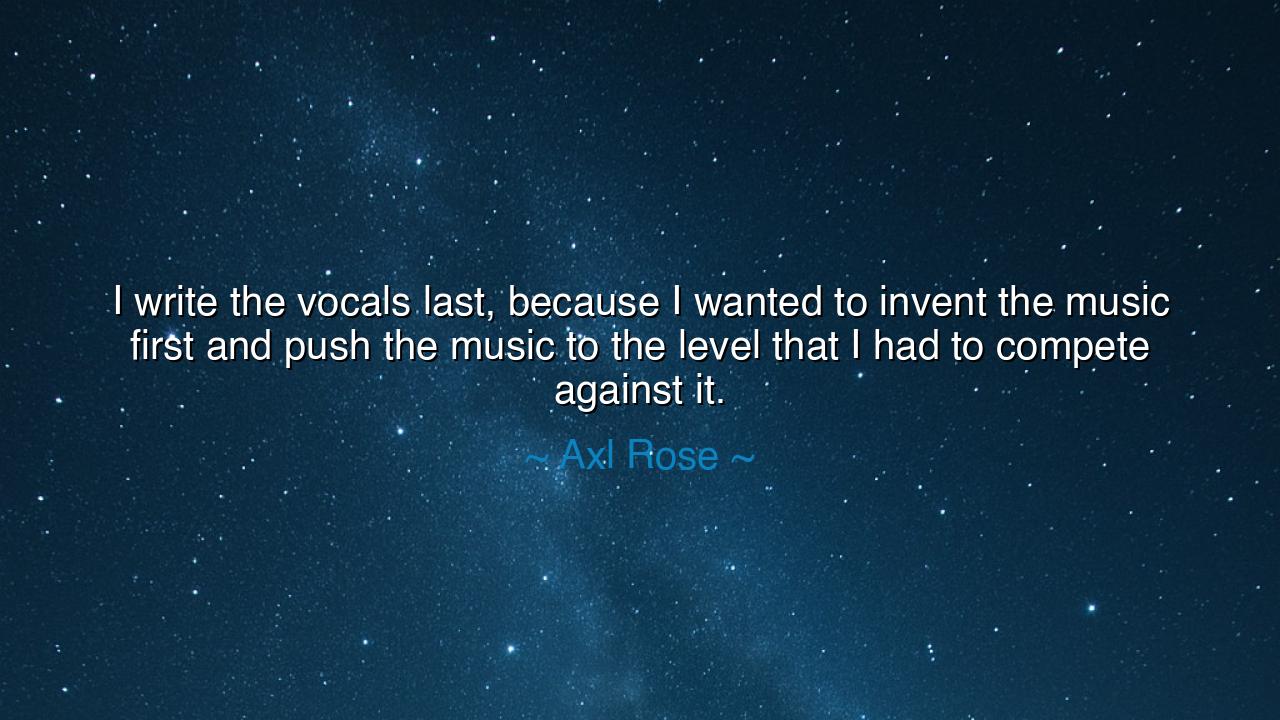
I write the vocals last, because I wanted to invent the music
I write the vocals last, because I wanted to invent the music first and push the music to the level that I had to compete against it.






Hear, O children of creation, the words of Axl Rose, who declared: “I write the vocals last, because I wanted to invent the music first and push the music to the level that I had to compete against it.” These words are not mere reflections of craft, but a revelation of struggle and artistry, of the battle between man and his own creation. For in them we learn that true greatness is not born of ease, but of daring to set a standard so high that even the self must strain to rise and meet it.
For behold, in the making of music, many begin with words, clothing melody in language before the foundation is laid. But Rose chose a harder road: to let the music itself speak first, to give it power, depth, and ferocity, until it became a mountain his own voice would have to climb. In this act we see the essence of artistry—not content with mediocrity, he sought to challenge himself, to push the boundaries until the singer was forced to compete with the song. Thus, the creation itself demanded greatness from its creator.
Consider the sculptor Michelangelo, who gazed upon blocks of marble and declared that the figure already lay within, waiting to be freed. He did not impose weakness upon the stone, but struck with such skill and patience that the marble seemed to resist him, forcing him to rise to its level. So it was with Rose: by forging powerful music first, he gave himself no choice but to rise higher, to discover a voice fierce enough, passionate enough, to match the strength of what was already born.
This lesson resounds across history. When Beethoven composed his Ninth Symphony, he set forth a work so monumental that even his deafness could not silence it. The choral voices, entering in the final movement, seem as though they are straining to keep pace with the titanic music beneath them. The vocals, as Rose described in his own practice, become a response to the music—a battle, a union, a triumph. In this way, art ceases to be a simple act of expression and becomes instead a test of the artist’s own soul.
Mark this truth: to set high standards for oneself is the path of all who seek excellence. The weak man makes his task easy, so that he may never struggle. The strong man makes his task difficult, so that he may grow in the struggle. By demanding of himself that his voice rise to the level of his own music, Rose embodied the principle that greatness is achieved when one competes not with others, but with oneself.
The lesson for you, beloved, is plain: in your labors, do not seek always for the easy path. Build your foundations strong, create challenges worthy of your highest effort, and then strive to match them. Whether in art, in learning, in leadership, or in daily life, let your own work demand greatness from you. In this way, your growth will never cease, and your achievements will echo with power.
Practical wisdom calls for this: when you set goals, make them bold. When you build, construct with care and strength, so that what you make will require your best self to stand beside it. When you create, push the work so high that you must climb to meet it. Do not be afraid of the struggle, for it is in striving that your soul becomes refined. Compete not against the world, but against the challenge you set for yourself.
Thus, remember the words of Axl Rose: to invent the music first, to make it mighty, and then to bring forth the vocals that must rise to meet it. This is more than the practice of a singer—it is the way of all who would be great. For when your creation challenges you, and you dare to rise and answer it, then your work shall live, not as noise, but as legacy.






AAdministratorAdministrator
Welcome, honored guests. Please leave a comment, we will respond soon